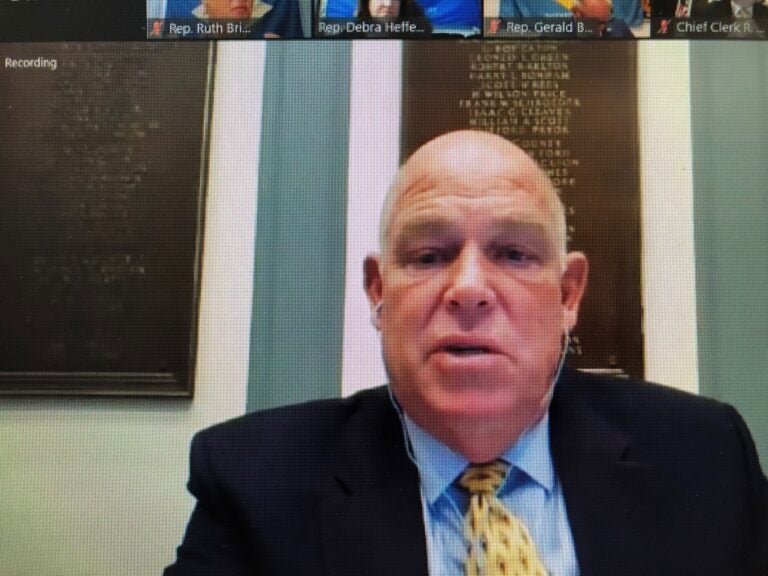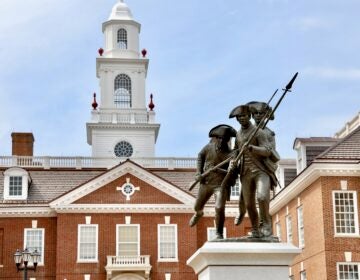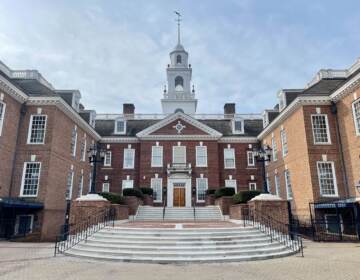Delaware bucks tradition and passes budget bills with time to spare
It’s been the practice to debate and cut deals until the wee hours of July 1 before approving a budget. The pandemic and virtual meetings stopped that this year.

Delaware House Speaker Pete Schwartzkopf presides over a virtual legislative session Monday that saw the state's final two budget bills approved. (Cris BarrishWHYY)
It took a pandemic to make it happen, but for the first time in recent memory, the Delaware General Assembly has passed all three major spending bills before the final day of the legislative session.
Acting in a brief Zoom meeting broadcast live on YouTube, the House and Senate defied their longstanding tradition of waiting, bickering and cutting deals, sometimes until after daybreak on July 1, the start of the fiscal year, to approve the general fund, construction and grant-in-aid spending plans.
The final step was passage, by the House, of two spending bills Monday: the $707 million bond bill for road and school construction and other projects, such as improvements to water quality, and the $54 million grant-in-aid package that provides money for fire companies, senior centers and nonprofits including WHYY, which will receive $175,000 for its Delaware news operation.
The $4.55 billion general fund budget passed last week in the truncated spring legislative session. Lawmakers suspended operations in March when the coronavirus crisis hit Delaware and have only met a handful of times in virtual sessions.
But without even getting together in Dover, the so-called money bills proposed in January by Gov. John Carney and amended by the legislative Joint Finance Committee are now on the way to Carney so he can sign them into law. He plans to do so Tuesday afternoon, which is June 30, the constitutionally mandated end of the session.
House spokesperson Drew Volturo couldn’t pinpoint the last time the budget bills passed so early, saying only that this year’s actions are “unique.”
Rep. Quinn Johnson, a Middletown Democrat who co-chairs the finance panel, credits communication and “knowing that because of the pandemic, we definitely have to work on this together. We provided, in detail, throughout the entire process what it was going to take to get out of it and everybody was already well-informed.”
The construction budget was $893 million, the largest in state history, but revenue losses cut it to $708 million. Though some road projects have been delayed, Rep. Debra Heffernan, a Democrat from Fox Point, said half of the money will go to transportation improvements. The rest will go toward building and renovating schools throughout the state and other projects, such as open space and farmland preservation, improving water quality and addressing “all the drainage problems we seem to be having in our state.”
So, with the budget matters complete and no time to debate or ponder more controversial legislation, like legalizing marijuana, all that’s likely left for Tuesday night — barring some unforeseen matter — is for lawmakers to gavel into session and meet until a little past midnight.
Then, in keeping with another tradition begun years ago to comply with the state constitution, lawmakers plan to call a special session at midnight and swiftly suspend it. That will allow leaders of both chambers to recall lawmakers over the next six months if there is an urgent matter they want to address.
The only public controversy over the budget surfaced when Republicans in the Senate initially refused last week to vote on the grant-in-aid package because they didn’t have time to study the revised bill, which included provisions to create two justice-related task forces proposed by the Legislative Black Caucus — one on law enforcement accountability, the other on African American issues.
The caucus made the task force proposals on June 10 as part of a Justice for All package of bills following protests and unrest in Delaware and across the nation after George Floyd was killed by a police officer in Minneapolis.
The Legislature did ban chokeholds and kneeholds like the one the officer used on Floyd, and passed the first leg of a constitutional amendment to ban race-based discrimination.
Johnson acknowledged that inserting the task force proposals into the grant funding was “unusual,’’ but said lawmakers ultimately agreed it was easier to do it that way than have separate bills that needed to be voted on separately. He pointed out that the grant-in-aid bill passed both chambers unanimously.
The general fund budget is 2.1% higher than the current one. Carney’s initial proposal would have grown the budget by 4%
Despite the decline, the budget doesn’t include program cuts or reductions in state services. It also includes $63 million in funding for the Budget Stabilization Fund, which is an extra reserve account the state can tap in times of economic trouble.
The measure also provides full funding for public schools, including an extra $27.7 million for expected growth in school enrollment.
WHYY is your source for fact-based, in-depth journalism and information. As a nonprofit organization, we rely on financial support from readers like you. Please give today.





